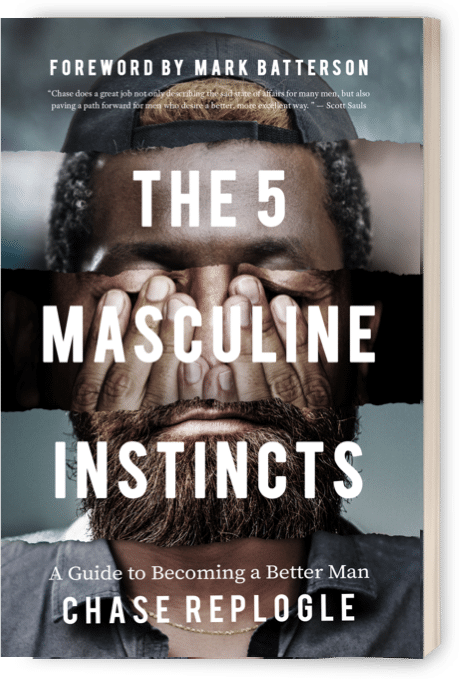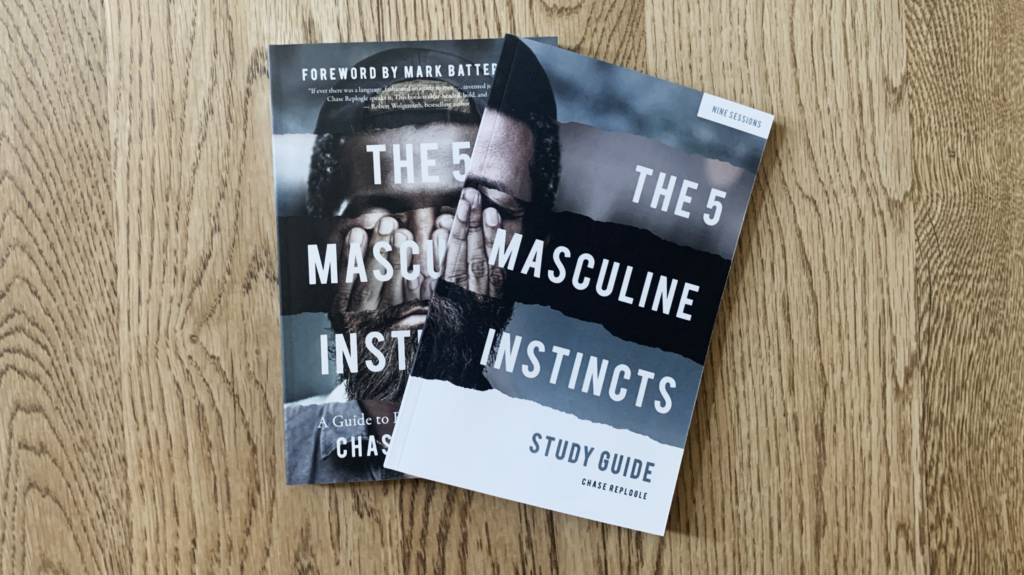Article
The Essential Masculine Virtue
Finding The Strength Between Aggression and Disengagement
Previous Post in This Series: The Two Ditches of Toxic Masculinity: Noah and The True Complexity of What is Wrong With Men
The Bible warns of man’s tendency to over-identify with his impulses of aggression and passivity, a topic I’ve explored at length in a previous article. But the Bible is also careful not to present these traits as mere personality types. We make a profoundly naive mistake in imagining that some men are aggressive while others are passive. As if the difference can be located in a gene or predetermined by some developmental event.
The Biblical image—and in my opinion, the fairly obvious observation of life and one’s self—reflects that we are more likely to swing repeatedly from one to the other. Aggression gives way to apathy, which eventually explodes again into aggression.
It may be that each man is more naturally inclined to one position, but our frustrated attempts at control often leave us searching for means of coping—means which can appear unlike ourselves. The man who finds his most ardent attempts at power and aggressive control to have failed often resigns to withdraw. The man who actively disengages eventually finds that his passivity has really been aggression, and he too lashes out when he can’t have his peace the way he wants it.
These oscillating attempts at control can be found in almost any number of Biblical characters, but Moses is a helpful place to observe it.
Moses’ Action and Inaction
At some point, Moses, the prince of Egyptian power, upon seeing the suffering of his own people, began to identify with their cause. The passive and powerless image of a baby carried by the currents of the Nile and raised by royal servants gave way to an impulse for action, an impulse driven by conviction. It is the defining act of Moses. Seeing an Egyptian master beating a Hebrew, Moses acts. Moses struck the Egyptian. He killed him and hid the body in the sand.
It’s hard to know just how premeditated Moses’ sudden involvement may have actually been. Was this the momentary impulse of passion or were there impulses building for something more, for a revolution, for a new way, for freedom, for a new identity? Whether it was first degree or second, Exodus suggests that it was violent and it was spoken of as murder. It is the Biblical image of aggression: Cain with is raised rock, Joab’s hidden dagger, and Pharaoh’s call to drown the infants. It is Moses’s first independent act, his coming of age—Moses, the man.
He becomes one by taking the life of another. And it backfired horribly. Far from sparking revolution or seeding defiance in his native tribe, his people mocked him. The next day, a fellow Hebrew, fighting with another Hebrew, snickered back at Moses, “Are you going to kill me too.” With neither the people nor Pharaoh on his side, Moses’ attempt at control had produced only isolation. He ran. Far from Egypt, he fled to the wilderness. Tucked into the rocky crags of Middean, the sound of bleating sheep around him, the cries of Egyptian cruelty finally resolved into silence.
It’s hard to criticize Moses for wanting the solitude of that place. It changed him. Moses of the wilderness now seemed so far from the Moses of Egypt. Take Moses’ hesitancy when God called him back to Egypt. “Oh, my Lord, I am not eloquent, either in the past or since you have spoken to your servant, but I am slow of speech and of tongue… Oh, my Lord, please send someone else.”
It’s hard to imagine Moses as a man afraid to speak. It’s hard to imagine the aggressive and impulsive Moses begging to keep his seclusion, wanting someone else to go in his place. His defining first characteristic had been action and Moses would go on to speak boldly before Pharaoh and passionately before his people. We have an entire book of his sermons. Or remember his frustration at the people’s lack of faith. Just before he raised his staff and struck the rock? He berated them, “Listen, you rebels, must we bring you water out of this rock?” He hardly seems “slow” of speech. Is not his striking of the rock an image of the same aggression which he showed that first day in Egypt? So who is this timid man in the desert?
Like most men I know—myself included—Moses can not be easily dismissed as either aggressive or passive. His life is a complicated twisting of these traits. Intertwined in his story are these two ways of acting, two ways of carving out a way of being in the face of a world which so rarely gives way to his control. Moses strikes, and Moses retreats. Moses acts, and Moses begs not to be involved. Any man who is honest with himself—shy and timid or are aggressive and resolved—knows that these two ways of being exist in all of us.
No One Is Talking About Meekness
Twisted with these two threads is an uncommon virtue which Moses is credited with possessing more than any other man on earth. “The man Moses was very meek, more than all people who were on the face of the earth.”
I have come to believe that meekness is the defining quality of Biblical manhood. Probably not something you’ve heard before. Without a proper understanding of what it means to be meek, we are ill-prepared for understanding masculinity, maturity, and in the end, ourselves. I think I can show you why it is so important.
I chose not to use the word meekness in the title of this article for a good reason. I’m not naive. Talking about meekness is not a topic most men are interested in. It gets some vague sense of approval for Jesus’ having included it in his Beatitudes, but no one is talking or thinking about meekness—not in this world. How would you take it if someone said, “When I think of you, I always think of meekness. You’re just such a meek person.” Could you even conclude that it was meant as a compliment? Whatever Jesus meant by “the meek shall inherit the earth,” it’s hard to see much evidence of it. Who of our heroes would we call meek? Who of our great leaders? Who of our great masculine role-models?
But Moses earned the distinction, “meekest man on earth.” He earned it through a specific situation recounted in Numbers 12. Israel was trudging through its wilderness years and beginning to show wear. As seems to happen anytime a group of people attempt a common goal, complaining set in and suspicion soon followed. Worst, the most destructive resistance was forming within his own family. Miriam and Aaron were whispering and critical behind Moses’ back. “Has the Lord indeed spoken only through Moses? Has he not spoken through us also?” Word was getting around, and even Moses must have realized things were coming to a head.
How did Moses respond—the man who had received his audible calling from a burning bush, the man who had faced off with Pharaoh and his sorcerers, the man who had received the law on the mountain of God and had led Israel through war and water? How did he respond? Moses did nothing. He didn’t respond. Moses chose not to act. But it wasn’t passivity. He would eventually pray and beg God to spare the very people who cut him down. For this inner strength, navigating when to act and when to refrain, Moses is called meek. Maybe that seems weak to you. If so, you’ve probably never tried it.
A Pollutant of Progress?
The aggression and passivity that are typical of our responses are really both symptoms of insecurity. The man who strikes in anger and the man who shuts his eyes share this similarity, they are both insecure. They are both searching for a way to control their situation, one by dominating it the other by ignoring it.
Moses’ meekness is not his natural disposition. He, too, was prone to strike and run. But the faithfulness of God had formed in him a perspective which, even when his control was tested, mitigated that insecurity and allowed him to overcome the impulse to revert to his base inclinations. The inner strength which Moses possessed was a faith that control is not ultimately his anyway.
The German philosopher Nietzche saw meekness as a Christian pollutant, hindering the progress of man. Nietzche saw modern man’s rejection of God as an opportunity to form a new stronger humanity. From Nietzche’s perspective, the constraint meekness imposed on man’s ambition only held him back. Virtues like meekness kept man from claiming the full potential of his control. Derek Rishmawy explains that Nietzche “thought meekness was exactly the sort of false virtue that the weak would applaud because, well, it’s about the only virtue they could actually pull off. Since the weak can’t win by the standard rules, they change the rules.”
I think Nietzche’s evaluation of meekness feels very modern. It is a virtue weak men claim to justify their weakness. It is the virtue of a man who has no success to call his virtue. It is the kind of virtue we only claim when we have failed or are too passive to try. But Nietzche was wrong. He, like so many men, are blinded by their own ambition and unwilling to call virtuous anything which might force their control into submission.
What Nietzche, and we, often get wrong about meekness, is that it is not an absence of power. Neither is it the warmed-up leftovers of our failed ambition. Meekness is a virtue precisely because it must be earned, it must be practiced, and it takes both maturity and strength to keep it.
A Better Image of Meekness
The greeks are known for their debating the value of various virtues, and meekness is one which often made their lists, although, as we will see, the Bible offers a unique source for obtaining it.
Plato uses the word to describe a general who, victorious in battle, was put in a position of ultimate power. He was justified in annihilating his enemy completely. But Plato called a general who instead spared the conquered people, meek in his treatment. Plato saw that not as appeasement but strength.
Similarly, the Greek philosopher and soldier Xenophenon used the word meek often in his description of war horses. The best horses would be tamed but not broken of their spirit. A horse prepared for battle would need to maintain its power, energy, and wild nature but be brought under the control of its rider. It’s nature needed to be disciplined but not forfeited. A prized warhorse still possessed all of the traits that made it wild: strength, determination, and fearlessness. It would face cannons and muskets, fire and smoke, cries, and chaos. But it must also recognize and respond to the most sublet shift of its rider, the kick of a heel, the whispered command, and at its best, anticipate even before commanded.
My wife grew up showing horses. She spent plenty of summer afternoons correcting my form and telling me to keep my heels down. Our horse could hardly be described as one ready for battle, but the willingness of an animal his size to cut in a new direction by only the slightest pressure of a knee is remarkable. Even after years of riding, he has not lost his disposition. He is still mischievous and prone to test the limits of each new rider, but once established, his obedience is remarkable. He is meek, not a statement of weakness but disciplined strength.
I marvel at the same strength in my bird dog, Millie. We have spent years hunting together, and watching her work a field of pheasants is one of my favorite ways to spend a day. A great bird dog does not need to be trained to be interested in birds. You don’t teach a dog to hunt. That comes naturally. A dog with good genetics knows what to do and will often display beautiful points even as a puppy. The real question is, will the dog hunt with you. Will the dog hold point for you to get into a proper shooting position? Will the dog retrieve a downed bird to hand? Will a dog hold when it can smell a field of prey before it?
Meekness doesn’t breed out the horse’s power or the dog’s impulse to chase; meekness matures these drives into something useful, something controllable, something disciplined. A meek person feels the same burning passion for acting, but they have discovered their real strength lies in the discipline to be led by God, not their emotions.
This meekness is strength without the insecurity to prove it. It is self-control that doesn’t need to be in control of others. So much of what appears to be power is desperation, and so much of what appears to be strength is insecurity. Similarly, so much of what appears to be indifference is an obsession. Meekness knows what is true, without the need to prove it to oneself or others.
The Value of Authority
You could characterize the Greek virtue of meekness as a kind of disciplined self-control, but the Bible is more realistic about the difficulty of ruling ourselves. The Bible suggests we are the horse, not the rider.
The virtue of meekness can not be drummed up by determination. Such strength can not be manufactured by strength. Any attempt at self-control which is attempted by controlling one’s self is constantly prone to crack under the pressure of insecurity. The wild horse can not be tamed by himself. He needs a higher authority.
Peter captured an image of Jesus’ meekness in writing, “When they hurled their insults at him, he did not retaliate; when he suffered, he made no threats.” Where did such restraint and strength come from? Peter continued, “Instead, he entrusted himself to him who judges justly.” Jesus’ meekness is not his passivity before man, nor is it self-determination to demonstrate virtue and show himself to be a superior man. Jesus’ meekness is a submission to a greater authority. He entrusted himself. His meekness is a sign of his submission.
Spurgeon picks up on this mystery in writing, “‘The Lord is slow to anger,’ because He is GREAT IN POWER. He is truly great in power who hath power over himself. When God’s power doth restrain Himself, then it is power indeed: the power that binds omnipotence is omnipotence surpassed.”
The real question of meekness is not what you recognize in yourself but the authority you recognize beyond yourself. It is this yielding to surpassing omnipotence that produces meekness. Your strength is directly related to the strength of that authority to which you are willing to commit. Meekness requires a rider, a commander, an authority. We so easily identify and long to be that lone rider, seated upon his horse, determined and confident as he rides westward into the setting sun. But that is not our calling. We are the horse. Confident and strong, only when we are ruled by guiding authority. Without his direction, we are an undisciplined horse, spooked, and restless.
Consider how Andrew Murray linked this idea of meekness with a proper understanding of what it means to be a man. He wrote, “Men sometimes speak as if humility and meekness would rob us of what is noble and bold and manlike. O that all would believe that this is the nobility of the kingdom of heaven, that this is the royal spirit that the King of heaven displayed, that this is Godlike, to humble oneself, to become the servant of all!”
The Pull Potential of Man
Our modern masculine ideal is individualistic, ambitious, independent, and self-determined. Submission is its antithesis. Submission is seen as weakness and the forfeiting of the masculine ideal. Submission is domestic and womanish. To submit is to be broken and robbed of your masculinity. It’s no wonder submission becomes a perverted word in our demands of submission from others. But submission is rightfully a masculine ideal. It is man’s most wise move by which the strength of meekness is given room to form. It is our submission that builds strength. We must be broken, not to lose our masculine spirit but to have it matured into something stronger—something of use in this world, something of use to God.
The man, who can not be led, who submits to nothing but himself, is far weaker than the man who submits to God.
We need a new image of meekness and its priority in the lives of men. Meekness is the bridle of our aggression and apathy. It is the tugged reins by which God calls for our halt and by the same loosened, which he calls for our courageous action. Only the man who has submitted to his lead can discern the difference. He is a horse well prepared for battle, his undisciplined brother, only for pasture.
Nietzche was wrong. Meekness is not a sign of subjugation but submission. It is the power by which the kingdom of God reclaims the earth. For the proud men of Troy who boast only in victory, meekness is a trojan horse. As they beat their shields and fight to take the hill, they only lose it and themselves in the brutality of the process, a stream of men dejected and disengaged in their defeat. Our power is not in our elevation; our power is in the one we elevate above ourselves.
The full potential of man is not ultimately in his self-achievement but in his self-submission. Maybe this seems impractical and unrealistic. Perhaps it seems so idealistic as to be completely irrelevant. Nothing in this world seems to actually work that way. But it may be as Chesterton put it, “It is because we are standing on our heads that Christ’s philosophy seems upside down.”
Get Updates on New Articles
I know, no one wants more emails. I promise, no spam and you can cancel at any time. I’m excited to share more about The 5 Masculine Instincts with you. If you ever have questions, please feel free to send me a message.

Chase Replogle
Chase is the pastor of Bent Oak Church in Springfield, MO and hosts the Pastor Writer Podcast. A native of the Ozark woods, he enjoys being outdoors with his wife and two kids: sailing, playing the mandolin (badly), and quail hunting with his bird dog Millie.

Don’t trust your instincts—there's a better way to become a better man.
The BookArticle

The New 5 Masculine Instincts Study Guide: And Why I’m Optimistic for Men
It’s been over a year since I released The 5 Masculine Instincts. I wrote the book because, as a pastor, I saw the way so many men were wrestling with questions…
Article

The Responsibility of Fatherhood: How Fatherhood Begins With Just Showing Up
I believe it is a truth that a mother is made over a matter of months, but you always become a father in a single moment. I remember that moment…
Article

What the Church Gets Wrong About Men Today: Moving Beyond Beards, Bacon, and Blowing Things Up
Every semester, my Bible College held a separate men’s and women’s chapel, and every year we talked about the same things. My roommate would customarily joke, “Boys, today’s the day…




